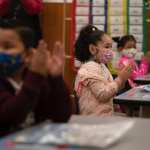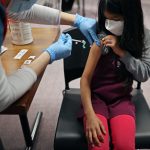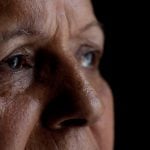As we enter the third year of COVID-19, with infections of the highly contagious omicron variant rocketing upward, the burden of staying safe and protected has fallen on some of the most vulnerable. Though early reports indicate that symptoms may be milder for omicron cases, it can still be dangerous for older people.
While vaccines and boosters have allowed many people to move about more freely, seniors and the people who care for them have had to remain vigilant. What should seniors and caregivers, both disproportionately women, do differently? Do people need to scale back on activities like going grocery shopping or seeing friends? Will services shut down again?
The 19th spoke with a wide range of experts about what older people and family caregivers should know about the risk omicron poses to seniors, as well as best practices to keep loved ones safe.
What do we know about the risk and severity of omicron to seniors?
Vaccinated older adults have significantly better outcomes than unvaccinated seniors, but the vaccine does not make people bulletproof. COVID-19 is still a threat to older adults, who are at higher risk of severe illness and death, according to the Centers for Disease Control and Prevention.
“Vaccine effectiveness is very good. But for all vaccines, older adults tend to have slightly less effectiveness than younger adults. Their immune systems don’t do quite as powerful a job at making antibodies,” said Sheila Moloney, a professor of nursing at Quinnipiac University and a Gerontological Society of America fellow.
“While vaccines are still the most effective way to protect our seniors, they are still at greater risk of severe COVID,” said Dr. Nina Blachman, director of the geriatrics fellowship program at NYU Langone Health.
According to the White House, two out of three eligible seniors have gotten a booster shot, which Blachman encourages older people to get. Vaccine mandates for professional caregivers — the people who care for many seniors — have stalled, and many fell through the cracks in the first place.
Moloney highlighted the importance of caregivers being vaccinated and boosted, which she said “brings a layer of protection for older adults.”
Are routine activities safe? What’s different with omicron?
Seniors and other high-risk populations may want to return to more stringent safety measures. Experts agreed that seniors and caregivers may want to scale back indoor activities while community spread of the virus is high. Blachman recommended swapping activities such as mall walking with outdoor walks or visiting a park.
“In some ways, we’re going back in time to some of the recommendations at the beginning of the outbreak,” said Dr. Jennifer Wolff, a professor of health policy and management at the Johns Hopkins Bloomberg School of Public Health.
Experts stressed the importance of tightly fitted, high-quality masks in situations where an older person may be in contact with a large number of other people. “If the older person is wearing a tightly fitted mask like an N95, it might be fine for them to go grocery shopping,” Blachman said.
Older adults and caregivers may also want to delay family gatherings and travel, depending on the numbers in their communities. Transmission numbers are especially high right now due to holiday travel in addition to omicron and may fall in the coming weeks and months. Moloney’s mother-in-law, for example, has been attending outdoor gatherings, but for the time being, she has recommended that her mother-in-law stay home.
What happens if senior centers and day programs shut down?
Senior centers and day programs are already shutting down in many places due to high transmission of coronavirus and staff shortages. While the closures may not be for as long as they were during the early pandemic, the lack of support can still cause both older adults and their caregivers stress.
“Family and other unpaid caregivers are doing the lion’s share of care delivery and assistance for non-medically-oriented tasks,” Wolff said.
Other family members and neighbors can be lifelines in situations when an older person’s usual caregivers are unavailable. But Bob Stephens, vice president of caregiving and health programs at AARP, recommends making caregiving plans – documents that map out contingencies when a program or professional caregiver isn’t available, or if a primary caregiver becomes ill. AARP offers planning guides to help family caregivers prepare.
For family caregivers who are working full-time, he also recommends looking at employee benefits. Many employers offer back-up child care as a benefit, but some offer back-up elder care as well.
“Depending on the level of benefit your employer has, they may allow you a certain number of hours throughout the year where you can have that backup care,” he said.
How can caregivers avoid burnout?
One major risk caregivers face, as they take on an even greater share of caregiving responsibility, is burnout. “COVID is just exacerbating caregiving challenges,” Wolff said.
Stephens told The 19th that AARP research has indicated that caregivers’ stress levels have risen during the pandemic. There are systemic issues at work: Care infrastructure has been underfunded for decades, and COVID has only made the situation worse.
“It’s important to recognize this is a difficult time. … Coping strategies are going to be different for each person and the circumstances are going to be different for each person. Just try to lower expectations and be patient with each other. Be gentle with ourselves,” Wolff told The 19th.
Stephens recommends peer support for family caregivers. While in-person support groups are currently inadvisable, she said, online support is available.
“Family caregivers really value talking to people who are in their shoes. The ability to have a conversation with someone that knows exactly what you’re talking about is important,” Stephens said. AARP maintains a Facebook group for that purpose. Anyone can join but, “we keep it private to keep it a safe space,” Stephens said.
How can caregivers protect seniors from vaccine misinformation?
Beyond the virus itself, there is also a looming threat of misinformation. Older adults are at greater risk of misinformation about COVID-19 and vaccination.
AARP has been working with the News Literacy Project on webinars to help educate seniors and caregivers on determining the truthfulness of online information. They have also conducted webinars on how to have productive conversations about misinformation with loved ones.
“We try to make sure folks have a lot of information plainly out there,” Stephens said.
To combat misinformation, Wolff recommends having seniors seek advice from health care providers they have long-standing relationships with and trust. They may be more receptive to hearing from someone they perceive as a trusted authority figure, rather than from their children or grandchildren. She also recommends approaching the issue from a caring perspective, rather than a moralistic one.
“Try saying ‘I really care about you. I just want to see you stay safe,’” she said.






